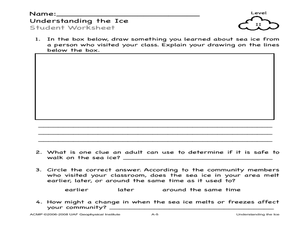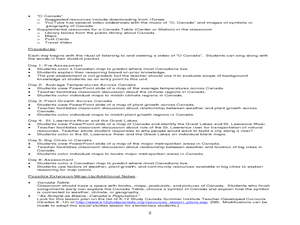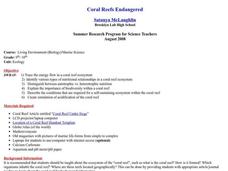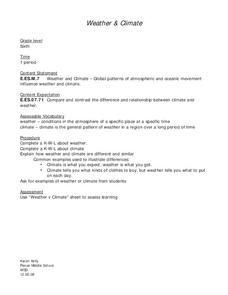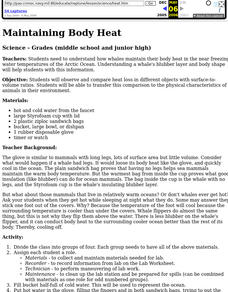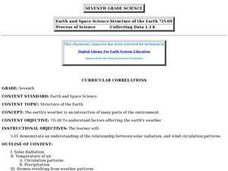Curated OER
March of the Penguins DVD Worksheet
In this movie comprehension worksheet, students view the DVD "March of the Penguins", then complete 31 short answer comprehension questions about the movie.
Curated OER
Is Air a Fluid?
Students use baking soda, vinegar, matches, and other materials to pour gas. In this air lesson plan, students use the materials to pour gas and learn that air can be a fluid like a liquid.
Curated OER
Frozen Film
Students discover how light reflects off surfaces. In this hands-on demonstration, students examine how variations in color are produced by light interference.
Curated OER
The Water Cycle and Global Warming
Students study the flow of water in the environment. In this water cycle lesson students evaluate the consequences of changes in the water cycle using data.
Curated OER
Understanding the Ice
Learners explore the concept of sea ice. In this sea ice lesson, students interview arctic hunters to regarding the sea ice safety and attributes.
Curated OER
Saltwater Science
Students conduct an experiment that shows them how salt water allows things to float. In this salt water lesson plan, students mix ingredients together to create salt water and observe how it makes the oceans dense. They then interpret...
Curated OER
The Earth's Energy Budget
High schoolers study the Earth's energy budget. In this investigative lesson students observe a lab that shows all aspects of heat transfer and light processes.
Curated OER
Where Do Canadians Live?
Students investigate Canadian people by researching the geography of the country. In this world geography lesson, students identify locations within Canada with large populations based on their access to waterways. Students view and...
Curated OER
What Factors Impact a Greenhouse?
Students analyze the Greenhouse Effect and the science of greenhouses. In this global climate lesson, students read background information about the 'greenhouse effect' and define 'albedo.' Students examine pictures of clouds, read about...
Curated OER
Coral Reefs Endangered
Learners identify different types of nutritional relationships in a coral reef system and trace the energy flow. In this marine biology lesson students create a simulation of acidification of the coral reef.
Curated OER
Winds of Change
Learners investigate extreme weather patterns. In this current events lesson, students visit selected websites to study hurricanes and their causes. Learners write reports on their findings.
Curated OER
Climate and Change: Fitting the Facts Together and Acting on Them
Students examine climate change. In this current events lesson, students read the provided articles "Key Facts + Key Conclusions=0?" "Oil Companies Fund Climate Change Deniers," and "Acting on Climate Change Facts." Students respond to...
Curated OER
Exploring Rocks
Students recognize differences in the size, shape, texture, and color of different rocks. In this rocks lesson plan, students also learn and repeat back how a volcano erupts and make one out of a toilet paper tube.
Curated OER
Geography of Puerto Rico - Review Questions
In this geography of Puerto Rico worksheet, students answer short answer questions about facts of geography in Puerto Rico. Students complete 10 questions.
Curated OER
Weather & Climate
Sixth graders differentiate weather and climate. In this earth science lesson, 6th graders complete a KWL chart about the two. They complete a worksheet by identifying whether a certain statement describes weather or climate.
Curated OER
Volcanoes and Urban Planning
Students analyze satellite image data of Volcan Villarica. In this earth science lesson, students identify dangerous areas surrounding the volcano. They propose a new safe location for the town.
Curated OER
Maintaining Body Heat
Students observe and compare heat loss in different objects with surface-to-volume ratios. They transfer this comparison to the physical characteristics of animals in their environment. They focus on how whales maintain their body heat.
Curated OER
Water Quality Monitoring
Students comprehend the four parameters of water quality. They perform tests for salinity, dissolved oxygen, pH and clarity or turbidity. Students comprehend why scientists and environmental managers monitor water uality and aquatic...
Curated OER
Maintaining Body Heat
Students observe and compare heat loss in various objects with surface area-to-volume ratios and transfer this comparison to the physical characteristics of animals in their environment. In small groups they conduct an experiment...
Curated OER
Biomes: Extreme Climate
Students discuss the causes of global warming. In this earth science instructional activity, students examine how global warming is connected to the arctic and world climate. They write a paragraph about their interconnection.
Curated OER
Oceans
In this oceans worksheet, student use clues from a song titled "Oceans," then locate and label the 5 oceans. An answer key is given but page doesn't included a song link.
Curated OER
Earth's Weather
Seventh graders learn how solar radiation, latitude, and other factors affect weather. They break into six groups and are assigned a topic to research and to present their findings orally.
Curated OER
Water Density and Stability Lab
Learners observe how different water densities and salinity control the depth at which different water masses occur. Submarines are used as a case study. This is a well-designed with an excellent worksheet.
Curated OER
Activity 1-Cold Water, Hot Water and Super-Heated Water!
Students investigate hydrothermal vents by observing a simple model designed to show that hot water rises when it's heated. First, students listen as the teacher explains hydrothermal fluids and vents. Students watch as the teacher...






